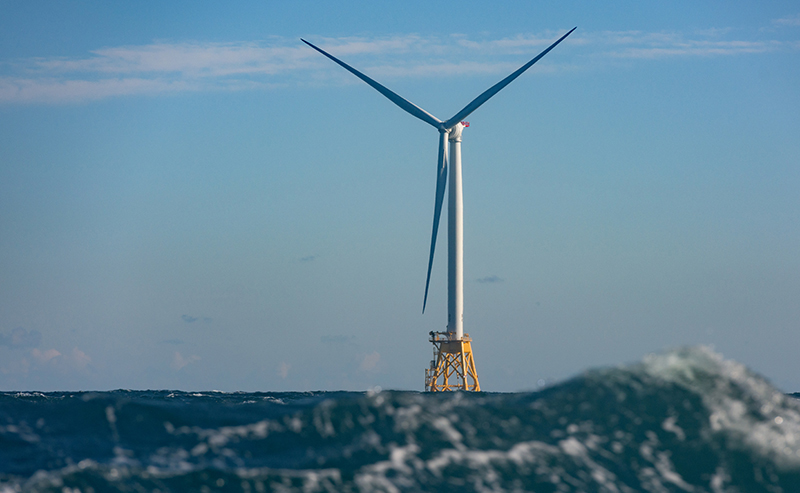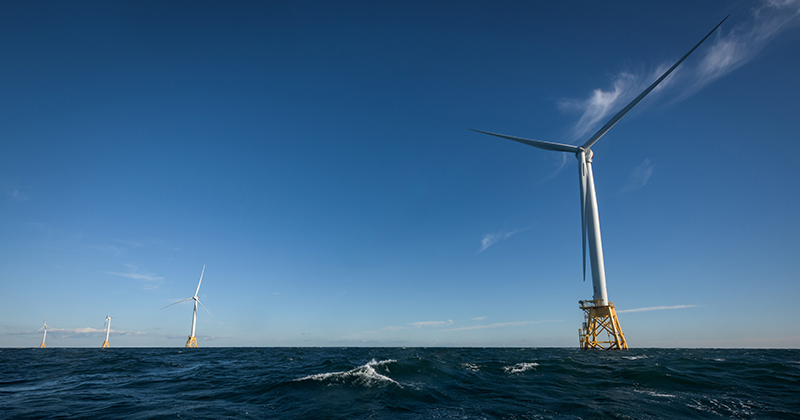


Empowering an industry
Photos by Evan Krape October 19, 2018
New academy at UD to train offshore wind energy professionals
The University of Delaware, in partnership with the Energy and Climate Academy of Denmark, unveiled a new Offshore Wind Skills Academy this week at the American Wind Energy Association conference Oct. 16-17 in Washington, D.C. The Academy will provide instruction in the basics of wind power, offshore wind turbines, and the development of offshore wind projects to professionals from traditional energy industries, supply chain companies, regulators, investors and others. This is the first offshore wind skills training program in the United States to focus on professionals and managers seeking to enter the industry.
Substantial offshore wind energy projects are likely to be built off the coast of the northeast United States in the next 12 years because of state government requirements to purchase offshore wind power. Because the North American offshore wind industry is still in its infancy — with only 5 offshore wind turbines in operation in U.S. waters — meeting that demand will require significant effort either by global offshore wind companies to learn about the specifics of operating in the United States or by American companies to learn how to enter the growing market.
The new Offshore Wind Skills Academy will focus on those seeking to build a domestic industry, with education on how wind power works, the logistics of building a wind power project, and the details of planning a wind power installation. There will also be information specific to the United States market, including permitting, environmental assessments, and local suppliers and ships, which would be useful for any professionals interested in working here.
Willett Kempton and John Madsen are professors in UD’s College of Earth, Ocean and Environment and its Center for Carbon-free Power Integration, where they study various aspects of wind energy. They have been named the inaugural directors of the Offshore Wind Skills Academy.
Kempton pointed out it is not only the developers of new offshore wind energy projects who could benefit from the Offshore Wind Skills Academy. Many professionals and small businesses have expertise in areas necessary for offshore wind but don’t know the industry. With this supplemental training, those hydrologists, geophysicists, environmental engineers and others could then provide services to the wind power developers.
“The northeast states in the U.S. have committed to 10,000 megawatts of offshore wind to be built in the next 10 years,” Kempton said. “That is the equivalent of building an entire nuclear power complex each year for the next 10 years. There is not anything like the number of people we need to do that. We wanted to be part of the overall effort to train the professionals, managers and new entrants to this industry.”
Faculty at the College of Earth, Ocean and Environment have studied the potential in wind power for years, assessing everything from the amount of wind to the geology of the seafloor and the marine life in the offshore lease areas designated by the Bureau of Ocean Energy Management. They will provide the US-specific information to course attendees. Technical information on contracts, feasibility studies, logistics and more will be taught by instructors from the Energy and Climate Academy, a Danish company that has been providing this kind of education in the European market since 2004 and has trained more than 2,000 professionals there.
The Energy and Climate Academy’s CEO, Torben Kirkegaard, said that based on his experience in Europe, he expects businesses in the United States to be surprised by the need for construction expertise when demand for wind energy hits its peak. He likened the development of the wind energy industry to a ketchup bottle, which you smack repeatedly with no apparent effect until all of a sudden it just pours out.
“We have always tried to go where we have seen a new market develop. We think offshore wind is really going to take off now in the East Coast,” Kirkegaard said. “We could be able to accelerate the development of the offshore wind industry [in the United States].”
The first sessions of the Offshore Wind Skills Academy will be held in January of 2019, with one- and two-day versions of Introduction to Offshore Wind and a three-day Offshore Wind Farm Project Development advanced course. After that round of courses, the Academy will offer classes in May and November each year, adding topics over time. Other courses under development will address topics including engineering, financing and construction planning.
The initial offering of 1-, 2- and 3-day courses will be Jan. 28-Feb. 1, and will cost $800 per day. Registration is available at pcs.udel.edu/wind.

Contact Us
Have a UDaily story idea?
Contact us at ocm@udel.edu
Members of the press
Contact us at 302-831-NEWS or visit the Media Relations website

